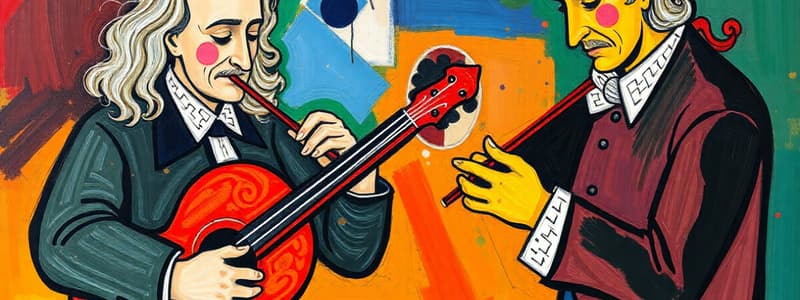Podcast
Questions and Answers
What is a defining characteristic of melodies composed during the Classical music period (1750-1820)?
What is a defining characteristic of melodies composed during the Classical music period (1750-1820)?
- Tuneful melodies with clear phrases and balanced structures. (correct)
- Highly ornamented and rhythmically complex melodies.
- Chromatic melodies that frequently modulate to distant keys.
- Dissonant melodies lacking a clear tonal center or resolution.
Alessandro Scarlatti's opera overtures are historically significant because they foreshadowed the structure of which instrumental form?
Alessandro Scarlatti's opera overtures are historically significant because they foreshadowed the structure of which instrumental form?
- The Classical symphony. (correct)
- The opera aria.
- The Baroque concerto grosso.
- The fugue.
Domenico Scarlatti significantly contributed to the development of the sonata as a genre for which instrumental setting?
Domenico Scarlatti significantly contributed to the development of the sonata as a genre for which instrumental setting?
- Solo keyboard instruments. (correct)
- String quartets.
- Large orchestral ensembles.
- Vocal ensembles with basso continuo.
Christoph Willibald Gluck's operatic reforms aimed to shift focus away from which element prevalent in earlier opera styles?
Christoph Willibald Gluck's operatic reforms aimed to shift focus away from which element prevalent in earlier opera styles?
Carl Philipp Emanuel Bach's 'Empfindsamer Stil' is best characterized by its:
Carl Philipp Emanuel Bach's 'Empfindsamer Stil' is best characterized by its:
In sonata form, what is the primary function of the 'Development' section?
In sonata form, what is the primary function of the 'Development' section?
The Classical period in music (1750-1820) coincided with which major intellectual and cultural movement?
The Classical period in music (1750-1820) coincided with which major intellectual and cultural movement?
What was a notable shift in musical notation practices during the Classical period?
What was a notable shift in musical notation practices during the Classical period?
Which composer is recognized for bridging the Baroque and Classical periods through his development of the 'Empfindsamer Stil'?
Which composer is recognized for bridging the Baroque and Classical periods through his development of the 'Empfindsamer Stil'?
In the context of the Classical period, what does the term 'classical music' (with a lowercase 'c') generally refer to?
In the context of the Classical period, what does the term 'classical music' (with a lowercase 'c') generally refer to?
Flashcards
Classical period
Classical period
The era in music from 1750 to 1820, marked by forms like sonatas and concertos.
Sonata form
Sonata form
A musical structure with three main sections: Exposition, Development, and Recapitulation.
Exposition
Exposition
The first section of sonata form that introduces the main themes.
Development
Development
Signup and view all the flashcards
Recapitulation
Recapitulation
Signup and view all the flashcards
Alessandro Scarlatti
Alessandro Scarlatti
Signup and view all the flashcards
Domenico Scarlatti
Domenico Scarlatti
Signup and view all the flashcards
Christoph Willibald Gluck
Christoph Willibald Gluck
Signup and view all the flashcards
Carl Philipp Emanuel Bach
Carl Philipp Emanuel Bach
Signup and view all the flashcards
Oratorio
Oratorio
Signup and view all the flashcards
Study Notes
Classical Music (1750-1820)
- Classical music emerged in the mid-18th century
- Composers aimed for elegant and perfect forms
- Structures were clearly defined, with tuneful melodies and harmonies progressing through keys
- The 18th century was known as the Age of Enlightenment, characterized by significant social and political changes across Europe
Alessandro Scarlatti (1660-1725)
- Italian composer
- Constructed overtures for operas with three sections (movements): a quick one, a slow one, and another quick one
- These sections later formed parts of symphonies
Domenico Scarlatti (1685-1757)
- Alessandro Scarlatti's son
- Defined the sonata as a solo instrumental piece
- Developed the use of musical ornaments (fast notes played together in a flourish)
Christoph Willibald Gluck (1714-1787)
- Changed opera's direction
- Focused on simple and dramatic storylines
- Employed strong characterization in operas like Orfeo and Eurydice (1762)
- Utilized music to express the words and drama of the opera
Studying That Suits You
Use AI to generate personalized quizzes and flashcards to suit your learning preferences.





